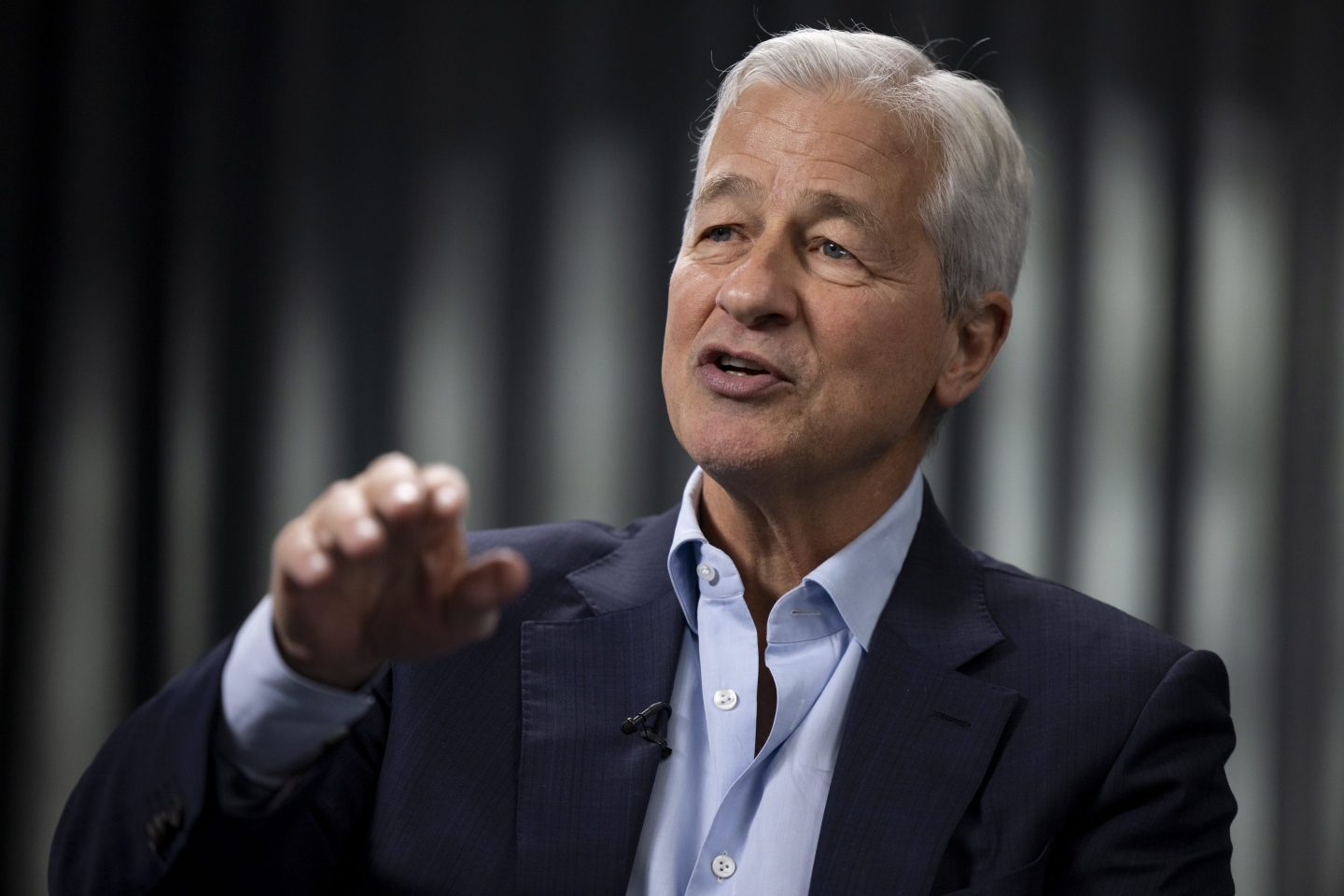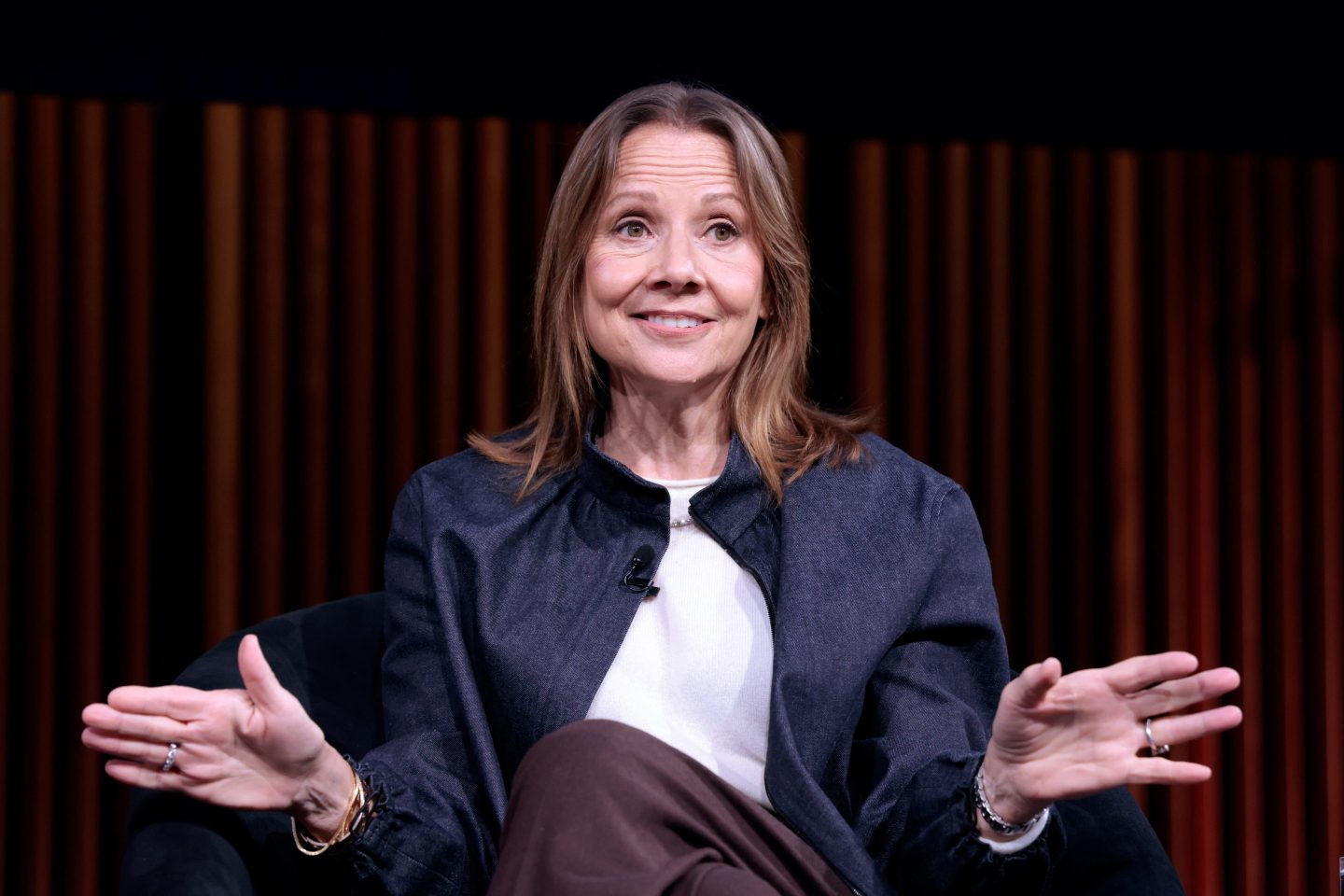“I’m going to start by telling you that I’m a full-throated, red-blooded, patriotic, unwoke, capitalist CEO,” JPMorgan CEO Jamie Dimon said to laughter at an event hosted by the Female Quotient at the World Economic Forum last week.
“I’m not woke anything,” he emphasized.
Still, the bank, which this week recorded its most profitable year ever with $50 billion in net income—and is approaching a market value of $500 billion—isn’t retreating from its diversity efforts despite the “ridiculous ESG, DEI groups coming at us,” Dimon said.
Though he acknowledged the Supreme Court’s revocation of affirmative action as a must-heed edict, stating, “They spoke, we’ll salute, we’re going to follow the law,” the firm still plans to reach out to marginalized communities, though it will have to modify its processes around racial and gender quotas to remain compliant.
Otherwise, little will change in regard to DEI programs, Dimon said, while simultaneously chastising how some diversity initiatives are run. “The thing about these programs is that some work and some don’t. Some companies just give it lip service.”
JPMorgan’s DEI approach mimics that of any other line of business, requiring that its leads are fanatic about the details, facts, and analysis, Dimon said, stressing a point I’ve made ad infinitum in past raceAhead newsletters. “Your heart can be in the right place, but if you don’t really think about the execution stuff, you’re gonna fail.”
The CEO, who has steered the world’s most valuable bank for 18 years now, hearkened back to his earlier days with an anecdote. He recalled JPMorgan’s HR department bragging some years ago about the firm’s diversity progress, but fusing all underrepresented groups. (Think: women, Blacks, LGBTQ, Muslims.) He responded, “Don’t lump it together. Come back and show me the numbers by VPs, EDs [executive directors], MDs [managing directors], and hiring and retention.”
They did. Women? Excellent. Hispanic? Excellent. LGBT? Excellent. Asian American? Excellent. Black? Average. Worse still, the bank had been recruiting at Historically Black Colleges and Universities (HBCUs) for years. “I said, ‘That’s not JPMorgan. We don’t want to be average.’”
It was a turning point for the firm, which set up a separate effort focused on Black employees that was further necessitated when two he brought to the bank departed.
The first jumped ship when he was passed for promotion from ED to MD for the third time. The other was a managing director who was skipped over for a promotion in middle markets—but later rehired.
Concerning the first, Dimon sent queries as to why the ED hadn’t been elevated to MD and was told he didn’t have the platform. “I said, ‘What the hell does that mean?’” As it turned out, it meant the ED’s role wasn’t big enough—in this instance, he didn’t have enough direct reports—to warrant the higher position. “I’d never heard the word ‘platform’ used except when we were promoting a Black person,” Dimon said. It lit a spark. For all the roughly 500 EDs at the bank, he requested that the company track whether they had a platform and were on track for a promotion, according to their boss and their boss’s boss.
But, Dimon caveated, he’s not mandating that managers promote Black EDs. “That’s not what I’m doing. [Rather], are we honest? Do we talk about it? And if they don’t have a platform, we’ve gotta tell them.” Today, the bank tracks how all employees are moving up and through the company and who and how they’re bringing candidates into the firm externally.
There’s also been a learning curve for him, even at the most basic level, Dimon said, admitting that he recruited from Spelman, Howard, and Clark Atlanta University for some 35 years but was unaware that there are 107 HBCUs. The bank now recruits from around 26 HBCUs.
“You learn, and you reach out,” Dimon said. “We’re hiring great kids from these places who wanna work, give a damn, want a job, wanna work hard, and wanna get ahead. God bless ’em—and they’re gonna get a chance at JPMorgan regardless of color.”
Ruth Umoh
@ruthumohnews
[email protected]
What’s Trending
Big Four’s big drop. Accounting firm PwC has dropped some diversity targets in the U.S. And terminated racial and ethnic minority criteria for certain student internship scholarships after pressure from anti-DEI activists. FT
Under the radar. Despite all the DEI fear-mongering, few companies seem to have cut back on their programming while others are doubling down. But many are approaching it in a less “in-your-face way.” NYT
Funding dip. There’s been a yearly decline in funding for Black founders in the U.S. Since 2020, with a mere 0.48% of VC dollars ($661 million out of $136 billion) allocated to this demographic last year. That’s down from at least 1% the two years prior. TechCrunch
The Big Think
As anti-DEI lawsuits abound, what’s the board's role in protecting their company from legal challenges? “From a strictly pragmatic point of view, staying out of political crosshairs may be prudent,” writes Coins2Day’s Lila MacLellan. Lawsuits are time and money-intensive and can jeopardize a company’s reputation.
Yet Jennifer Kennedy Park, a partner at the law firm Cleary Gottlieb, presents a pretty compelling argument: “We’re worried now about the one-off lawsuit by the cisgender white man…when you probably have 20 lawsuits from people who don’t look like that.”
This is the web version of raceAhead, our weekly newsletter on race, culture, and inclusive leadership. Sign up for free.












